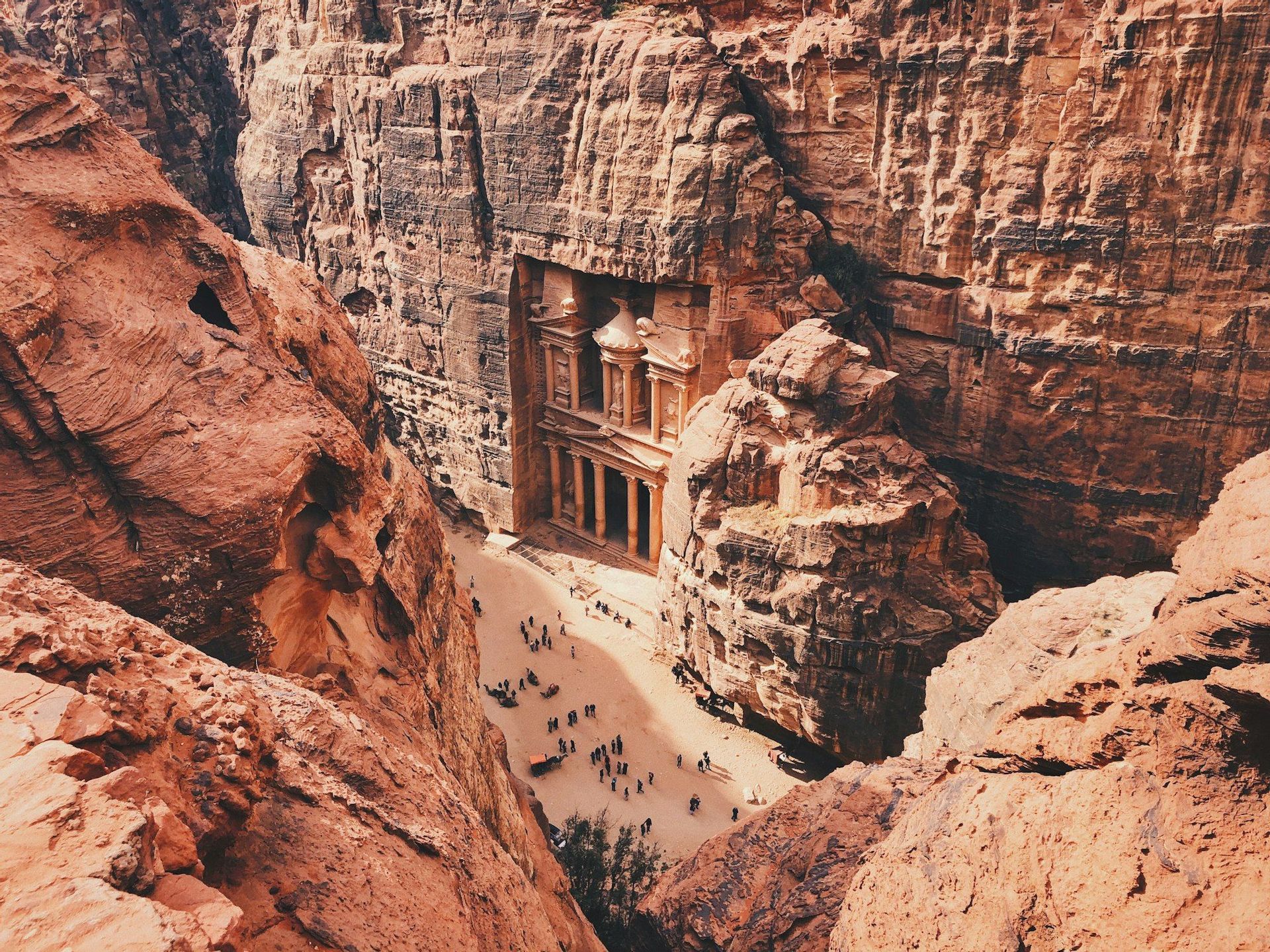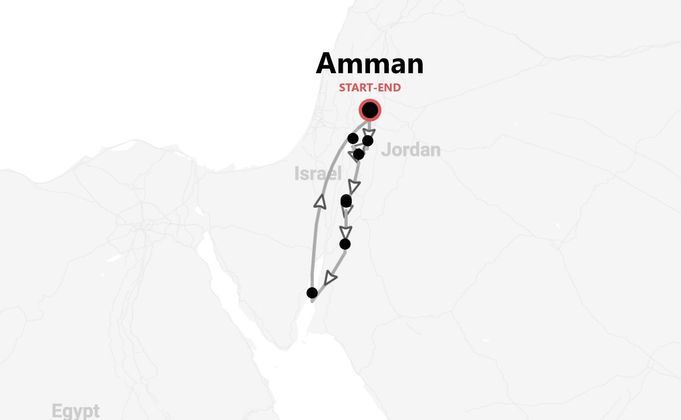
Group trips to Jordan
Our organized trips to Jordan
Where millennia of history embrace breathtaking natural beauty, Jordan invites you on an unforgettable journey. It's a land of awe-inspiring ancient wonders and mesmerizing desert vistas, offering experiences found nowhere else on Earth. From the iconic rose-red city of Petra, carved into cliffs by Nabataean ingenuity, to the serene, star-filled nights of Wadi Rum's Martian-like landscapes, and the unique, buoyant waters of the Dead Sea, every moment promises discovery. Jordan welcomes travelers eager for cultural immersion, thrilling adventures, and a chance to connect with a spirit of unparalleled hospitality.
FAQs about Jordan
If you are a UK citizen, to find out the entry requirements for Jordan, you can check this informational page from our partner Sherpa. If you need a visa, you can apply for it through Sherpa. If you are not a UK citizen, you can still use Sherpa by changing the nationality in the 'Passport' section.
Before traveling, always remember to check the government website of your country of origin for updates on the entry requirements for Jordan – you wouldn’t want to stay home due to a bureaucratic detail!
- UK residents: review the FCDO Travel Advice.
- US residents: consult the US Department of State Travel Advice.
- Other residents: refer to your government or local consulate's travel advice.
Additionally, we recommend purchasing the Jordan Pass for your trip to Jordan. This pass allows you to save time and money by combining a tourist visa (for stays longer than 3 nights) with prepaid admission to more than 40 tourist attractions, some of which we will visit during this trip.
Jordan is in the Eastern European Time Zone, which is GMT+3. Jordan also observes daylight saving time, so is always 2 hours ahead of the UK.
The currency in Jordan is the Jordanian Dinar. You can easily exchange money at:
- Banks
- Exchange offices
- Some hotels in major cities
It's always a good idea to have some local currency on hand for smaller purchases, as not every place accepts cards.
In Jordan, you can pay using credit cards and cash. Credit cards like Visa and Mastercard are widely accepted in hotels, restaurants, and larger shops, but it's always a good idea to carry some cash for smaller vendors or markets. The currency used is the Jordanian Dinar (JOD). You can exchange your money at:
- Banks
- Exchange bureaus
- Some hotels
ATMs are also available in cities and major towns if you need to withdraw cash.
Yes, tipping is generally expected in Jordan and appreciated for good service. In restaurants, a tip of around 10% is common if a service charge is not already included. For taxi drivers, rounding up the fare or adding a small tip is customary. Hotel staff, like porters and housekeeping, often receive a small tip for their services. It's always good to have some cash in local currency for tipping, as it's more widely accepted than cards for these small amounts.
The internet in Jordan is generally reliable, especially in urban areas like Amman and Aqaba. Most hotels, cafes, and restaurants offer free Wi-Fi, which can be quite handy. However, for more consistent access, especially when exploring more remote areas, you might want to consider getting a local SIM card, which you can get at the airport or in city centers. It's a convenient way to stay connected without relying solely on Wi-Fi hotspots. Just make sure your phone is unlocked for international SIM use.
In Jordan, the official language is Arabic. When you're there, you might hear or use some colloquial expressions like these:
- Hello: "Marhaba"
- Thank you: "Shukran"
- Yes: "Na'am"
- No: "La"
- Please: "Min fadlak" (to a male), "Min fadlik" (to a female)
English is also widely understood, especially in tourist areas, so you should have no trouble communicating.
In Jordan, they use Type C, D, F, and G plugs. The standard voltage is 230 V and the frequency is 50 Hz. If your devices are from Central Europe, you might only need an adapter if they use a different plug type, but most European devices should work without a voltage converter. It's a good idea to bring a universal travel adapter just to be safe.
The main religion in Jordan is Islam, with the majority of Jordanians being Sunni Muslims. When visiting, it's important to respect local customs, especially in terms of clothing. Women should consider wearing modest clothes that cover their shoulders and knees, particularly when visiting religious sites. Important religious holidays include:
- Ramadan, a month of fasting
- Eid al-Fitr, which marks the end of Ramadan
Packing for Jordan is all about being prepared for diverse climates and cultural experiences. Here's what you should consider putting in your backpack:
1. Clothing:
- Lightweight, breathable tops
- Long pants or skirts for modesty
- A warm jacket for cooler evenings
- Swimwear for the Dead Sea
2. Shoes:
- Comfortable walking shoes
- Sandals for warmer days
- Water shoes for rocky beaches
3. Accessories and Technology:
- Sunglasses and a hat for sun protection
- A power bank
- A camera for capturing beautiful landscapes
4. Toiletries and Medication:
- Sunscreen
- Insect repellent
- Basic first-aid kit
- Common travel medication like pain relievers and anti-diarrheal tablets
In Jordan, it's important to dress modestly, especially in religious or rural areas.
In Jordan, the weather can vary quite a bit depending on the region. Here's a quick breakdown:
- Amman and the North: Mild, rainy winters and hot, dry summers. Winter temperatures can dip to around 4°C, while summers can reach up to 32°C.
- Dead Sea Area: Generally warmer, with milder winters and very hot summers, sometimes exceeding 40°C.
- Aqaba and the South: Hot desert climate with very warm winters and scorching summers, often above 40°C.
The best time to visit is during spring (March to May) and autumn (September to November) when temperatures are pleasant.

